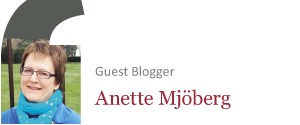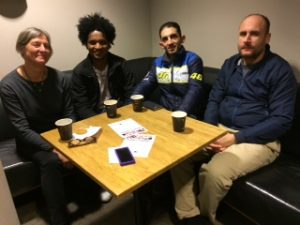My name is Anette Mjöberg and I’m working as a Library Director in Hässleholms’ Public Libraries. Hässleholm is a city in the south of Sweden close to Malmö and Lund. We have one main library and Six branches and 1 mobile bus for our 51,000 inhabitants. I have 25 staff in my organization .
So what do my staff and I focus on? Which fields of work are most interesting and important now and why? The topics are diverse – integration of refugees; makerspaces; co-operation; reading projects; and reorganization in teams.
Today I will write about the importance to work with integrations of refugees which continues to be a huge and very important task for all Libraries in Sweden.
In 2016 29 000 refugees arrived in Sweden compared to 166 000 in 2015. The rules for getting a residence permit have changed and some refugees choose to return to their home countries when it´s not possible for the relatives to come to Sweden.
Many new methods, arrangement and cooperative partnership have developed with public libraries to assist new arrivals. One of the most popular a most usual form are the ‘Language café’
Librarians and volunteers (eg from the Red Cross) help the refugees to learn and to understand the Swedish language.( not an easy language to learn! ). A lot of the refugees are well educated and so are motivated to learn Swedish. They know well that the best way, and sometimes only way is to learn the language to integrate in the Swedish society.
The biggest group of asylum seekers comes from Iraq , Syria, Afghanistan, Somalia and Eritrea . After trying the ordinary way of ‘Language Cafe’, we are trying to find new ways for the activity.
One of branches are going to try another type with a ‘Handicraft Café’ instead. The women asked in the Library for help to repair clothes and now the Library has bought a sewing machine! That´s another Way of learning Swedish, working with hands. My Libraries arranged about 100 cafes last year and that tell us how huge the need is for all newcomers in Sweden even if several of them are studying Swedish in the school for immigrants SFI (Swedish for immigrants).
We are now organizing a mobile library with materials for going the refugee accommodations, inviting unaccompanied young boys to the library through their teachers and some other activities.
The situation has happily resulted in several special donations to the Libraries for buying books, lexicons, and materials for beginners in Swedish. Some of the contributions made it possible for us to buy IPads and hiring a language trainee who speaks Arabic and want to improve her Swedish.
At a meeting around the integration process in my municipality I explained how we work and what we do in the Libraries and we were congratulated on our work. The advantage and gain for us is that other organizations, authorities and Municipality administrations have now discovered the important role of the Libraries in the process!
Anette Mjöberg

